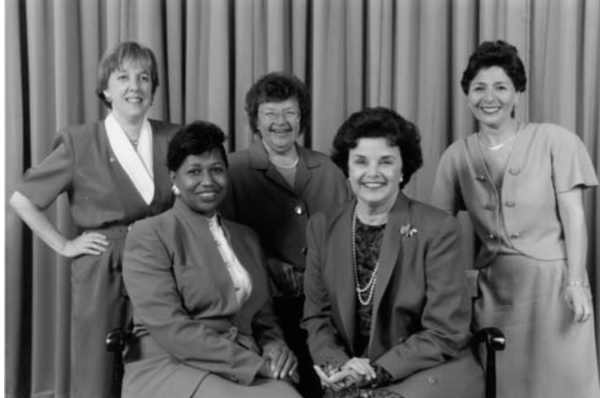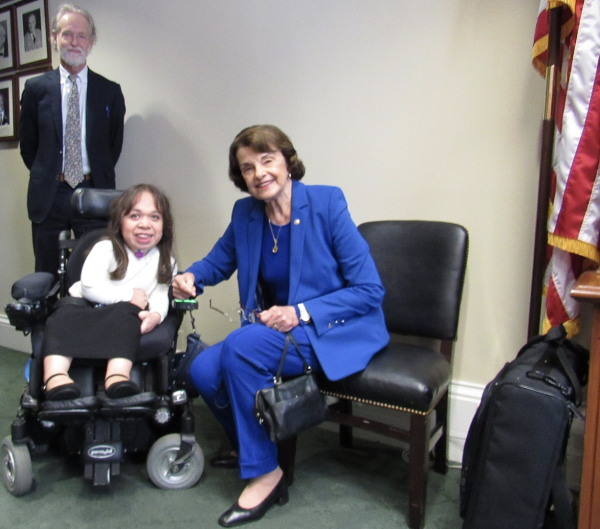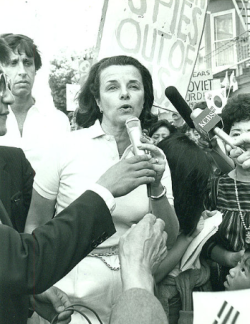Trailblazing mayor-turned-senator Dianne Feinstein passed away in September 2023 after holding a tenure of over forty years as a public servant. She was a leading Democrat and a pioneering female senator from California, leading the party in advocating for issues such as gun control, environmental conservation, and national security.
Her legacy has left an undeniable mark on American politics. Over a tenure of twenty-five years, she introduced over 918 bills, 140 resolutions and 795 amendments. Dozens of pieces of major legislation written by Feinstein have become law — from intelligence authorization bills to measures protecting California’s deserts to a bill banning the sale of prescription drugs online.
Beyond her legislative achievements, Feinstein’s leadership style and ability to navigate bipartisan cooperation made her a revered figure among colleagues, earning her widespread respect and recognition across party lines. However, in recent years, her long standing commitment to politics has earned her criticism, especially as her health began to decline due to old age. This coupled with her desire to incorporate centrist policies in an increasingly hyperpartisan political climate also often vexed her own supporters and party members.
“I think the Senate is bigger than any one individual member, even the most famous or longest serving. No one member can make a bill become law; it’s a collective body. At the same time, a single member, like Senator Feinstein, leaves her successor with big shoes to fill because she was known as a force in the Senate,” said Dr. Casey Burgat, Assistant Professor at the George Washington Graduate School of Political Management.
Dianne Feinstein, was born Dianne Emiel Goldman on June 22nd, 1933, in San Francisco, California. Her parents, Betty and Leon Goldman, were Jewish immigrants, with her father working as a surgeon and her mother as a housewife. As a young girl, Feinstein excelled academically, demonstrating an early interest in politics and leadership. In her senior year of high school, she was accepted into Stanford University.
At Stanford, Feinstein actively looked for opportunities to leave her mark on the community. She ran for a position as a freshman representative on the Associated Students’ executive committee and for secretary of the Associated Women Students. As a junior, she advised incoming female students on how to make their way on a campus where men outnumbered women three to one.
By the start of her senior year, Feinstein had established Stanford’s first chapter of Young Democrats, breaking away from her father’s staunch Republican identity.
After graduating in 1955 with a bachelor’s degree, she interned at the Coro Foundation in San Francisco, an organization whose goal was to provide young people with political experience.

In 1960, California Governor Pat Brown appointed Feinstein to the state’s Women’s Board of Parole, making her the youngest member in the nation. She held the spot until 1966, and two years later, she became a member of the San Francisco Committee on Crime.
In 1969, Feinstein entered her first political race and was elected to the San Francisco Board of Supervisors, eventually becoming the first woman ever to serve as the board’s president, a position she held for two and a half terms. She also ran for mayor of San Francisco twice during this period, losing in both the 1971 and 1975 elections.
She nearly gave up on her political career in 1978, convinced that she would never be elected mayor. Instead, she unexpectedly found herself in the position when both Mayor George Moscone and fellow city supervisor, Harvey Milk, the city’s first openly gay elected official, were assassinated. Feinstein first became acting mayor — San Francisco’s first ever female mayor — and was then elected the following year and remained in the post until 1988.
One of Feinstein’s top priorities during her nine years as mayor was public safety. She tackled crime by strengthening the San Francisco police force and reducing the response time for major emergencies from eight minutes to two. Fiscal responsibility and boosting the local economy were two other important concerns to her, and she developed economic relationships with major trading cities in Asia, Europe, and Africa. During her tenure, the famous San Francisco cable car system was rebuilt, city streets were repaved, and the sewer system was upgraded.
However, her mayoral tenure was also marred by much controversy due to her handling of the AIDS epidemic. At the end of Feinstein’s mayoral tenure, the Los Angeles Times reported, “more San Franciscans (were) dead of AIDS than from all the wars in this century, combined and doubled.” In 1982, backed by local government health authorities, Feinstein moved aggressively to close dozens of gay bathhouses, identified as sites enabling widespread spread of infection.
Yet, Feinstein also was one of the first government officials to address the crisis head on, organizing the first national AIDS task force through the U.S. Conference of Mayors. In partnership with research hospitals, community organizations, and the CDC, she constructed a public and private network of AIDS-related services, later viewed as the best in the world at the time.
After a failed 1990 attempt to win the California governorship, Feinstein regrouped and ran in a special election for a two-year seat in the U.S. Senate two years later. She won and was sworn in a week later on November 10th, 1992, becoming California’s first female senator. She was reelected to a full six-year term in 1994.
“Although I think that Senator Feinstein should have retired earlier than she did, I also do think that her legacy was important. She was one of the first female senators, and her legislative accomplishments are still impactful,” said Kathlyn Yan ’24.
Her first term as senator was incredibly productive. Feinstein co-authored the Gun Free Schools Act and the Hate Crimes Sentencing Enhancement Act, both signed into law in 1994. She also spearheaded legislation banning the manufacture, sale, and possession of military-style assault weapons. Although the final bill was a diluted version of Feinstein’s original legislation, it outlawed weapons like Kalashnikov and AR-15 style rifles typically used in mass shootings. Although the ban expired in 2004 and was not renewed, the bill was one of the first major legislative feats in combating gun violence.
Another issue that Feinstein prioritized was environmental protection, drafting the California Desert Protection Act, which called for the protection of more than 3 million acres (1.2 million hectares) of desert, national parks, and nature reserves in 1994. She continued to advocate for expanding the land covered by the legislation well into her career, ultimately prevailing when President Obama designated three new national monuments in California, expanding protection to 1.8 million acres of Mojave Desert landscape in 2016.

She served on several committees during her tenure in the Senate, including the Senate Judiciary Committee, of which she was the first female member, the Appropriations Committee, the Rules and Administration Committee, and the Select Committee on Intelligence. In 2007, when the Democrats regained a majority in the Senate, Feinstein became the first woman to serve as chair of the Senate Rules and Administration Committee.
In 2009, Dianne Feinstein made history by becoming the first woman to chair the Select Committee on Intelligence. Her tenure was marked by a commitment to national security and a focus on ensuring effective intelligence operations.
For six years, she found herself at odds with the Obama administration and the CIA over her efforts to compile and release a massive report on interrogation tactics the Bush administration used following the 9/11 attacks. In particular, Feinstein was disturbed by the existence of “black sites,” where torture could be practiced on terror suspects far from official eyes. Her committee’s report concluded not only that the torture was worse than previously reported, but also that it was not an effective way of collecting intelligence about terrorists.
The CIA did not want her to publish the report — formally known as the Senate Intelligence Committee Study on CIA Detention and Interrogation Program. Yet, Feinstein could not be dissuaded. After battling for almost a year, fending off accusations that her staff had hacked CIA computers, a summary of the report was released in December 2014. Although stripped of much of its graphic detail, the report still painted a brutal image of the private torture the CIA was conducting.
Although she was lauded for her numerous accomplishments, Feinstein also faced ire from both her opponents and her own party members for remaining in office despite her considerable age. By the time of her death at age 90, Feinstein was the oldest sitting U.S. senator and member of Congress. She was also the longest-serving U.S. senator from California and the longest-tenured female senator in history.
Senior congress people play a critical role as seasoned lawmakers. They often assume leadership positions in committees, bringing a wealth of expertise to guide legislative initiatives. Seniority provides them with a deep understanding of the intricacies of Capitol Hill, enabling them to navigate complex legislative procedures, build bipartisan relationships, and effectively negotiate with colleagues.
“Depending on the member and the issue area, senior members are often the driving force behind legislation. They have years (sometimes decades) of familiarity with the topic, they know the critical procedures and pressure points, they know the stakeholders, and they are more likely to have powerful positions in Congress (like committee chairships) that can help get bills over the finish line,” said Dr. Burgat.
However, many critics believed that Feinstein’s age outweighed her seniority. In later years, her health visibly declined, and she sometimes became confused when answering questions or speaking publicly. For instance, last May 2023, when a journalist asked Feinstein how she has been received by her colleagues since returning to Washington D.C., Feinstein insisted that she had never left.
“Dianne Feinstein, while certainly a capable senator, stayed in office longer than I think is appropriate. She was not fully able to do her job, and that should have been a signal to step down,” said Antonia Duffey ’24.
Many fellow Democrats appeared confused regarding her behavior during Justice Amy Coney Barrett’s confirmation hearings. At the end of the hearings, she hugged her Republican counterpart Lindsey Graham, stating, “This is one of the best sets of hearings that I’ve participated in.” She stepped down from her top position on the judiciary committee not long after, under pressure from liberal colleagues and constituents.
In February of 2023, Feinstein announced that she would not run for reelection in the 2024 cycle.
Ultimately, Feinstein’s passing in September of 2023 marked the end of an era in U.S. politics. Her contributions to gun control, environmental conservation, and various policy areas continue to be acknowledged across party lines.
“Although I think that Senator Feinstein should have retired earlier than she did, I also do think that her legacy was important. She was one of the first female senators, and her legislative accomplishments are still impactful,” said Kathlyn Yan ’24.

